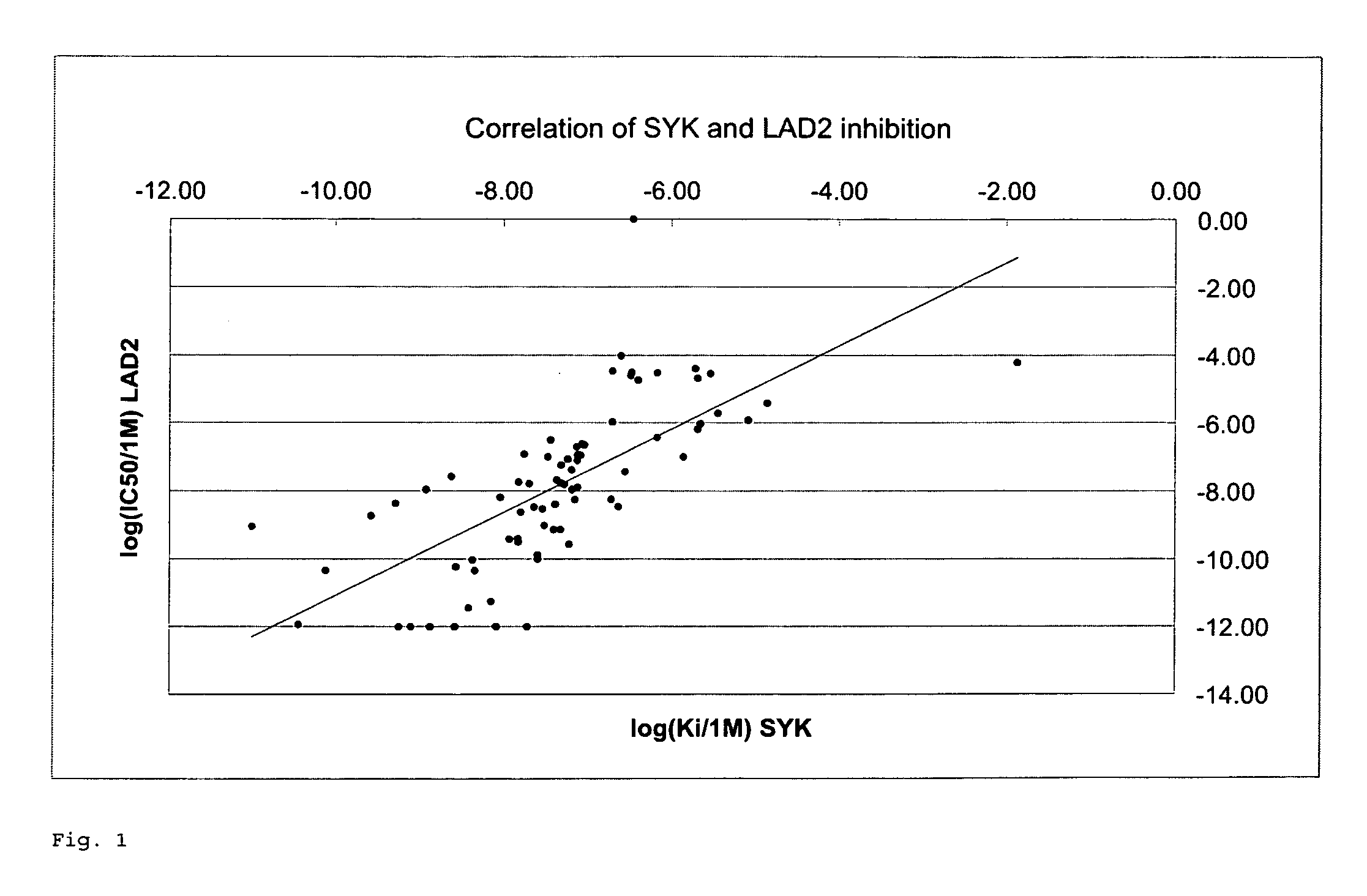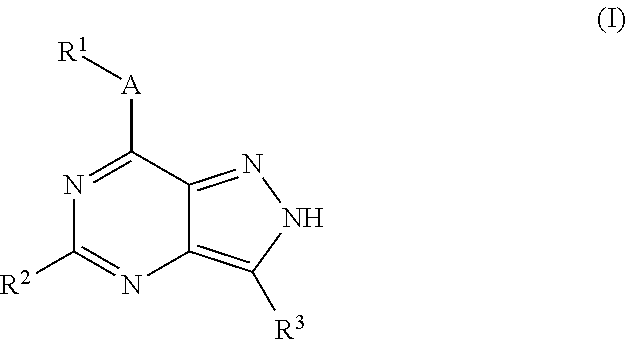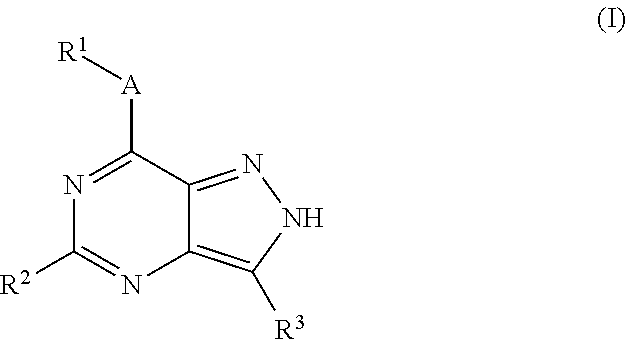Novel kinase inhibitors
a kinase inhibitor and kinase technology, applied in the field of new kinase inhibitors, can solve the problems of obstructing blood flow, filling and narrowing the vascular space insufficiently, and all the treated vessels are restenosed
- Summary
- Abstract
- Description
- Claims
- Application Information
AI Technical Summary
Benefits of technology
Problems solved by technology
Method used
Image
Examples
example # 1
Example #1
Preparation of N-(1H-indazol-5-yl)-5-phenyl-1H-pyrazolo[4,3-d]pyrimidin-7-amine
[0191]7-chloro-2-(4-methoxybenzyl)-5-phenyl-2H-pyrazolo[4,3-d]pyrimidine (0.16 mmol) and 1H-indazol-5-amine (0.3 mmol 2 eq.) were suspended in MeOH (dry, 3 mL) in a microwave vial (2-5 mL), HCl in dioxane (4M, 3 drops) was added. The reaction mixture was irradiated in a microwave reactor for 5 min at 140° C. The reaction mixture was evaporated and used without further purification. The residue was dissolved in TFA (3 mL). The reaction mixture was irradiated in a microwave reactor for min at 140° C. The reaction mixture was concentrated and purified by semi-preparative HPLC-MS and freeze dried from water / t-BuOH 4 / 1.
[0192]exact mass: 327.1386 g / mol
[0193]HPLC-MS: analytical method A
[0194]rt: 2.194 min-found mass: 328 (m / z+H)
example # 2
Example #2
Preparation of N-(1H-benzo[d][1,2,3]triazol-5-yl)-5-phenyl-1H-pyrazolo[4,3-d]pyrimidin-7-amine
[0195]7-chloro-2-(4-methoxybenzyl)-5-phenyl-2H-pyrazolo[4,3-d]pyrimidine (0.16 mmol) and 1H-benzo[d][1,2,3]triazol-5-amine (0.3 mmol 2 eq.) were suspended in MeOH (dry, 3 mL) in a microwave vial (2-5 mL), HCl in dioxane (4M, 3 drops) was added. The reaction mixture was irradiated in a microwave reactor for 5 min at 140° C. The reaction mixture was evaporated and used without further purification. The residue was dissolved in TFA (3 mL). The reaction mixture was irradiated in a microwave reactor for 5 min at 140° C. The reaction mixture was concentrated and purified by semi-preparative HPLC-MS and freeze dried from water / t-BuOH 4 / 1.
[0196]exact mass: 328.1316 g / mol
[0197]HPLC-MS: analytical method A
[0198]rt: 2.336 min-found mass: 329 (m / z+H)
example # 3
Example #3
Preparation of 5-phenyl-N-(4-(piperidin-1-yl)phenyl)-1H-pyrazolo[4,3-d]pyrimidin-7-amine
[0199]7-chloro-2-(4-methoxybenzyl)-5-phenyl-2H-pyrazolo[4,3-d]pyrimidine (0.16 mmol) and 4-(piperidin-1-yl)aniline (0.3 mmol 2 eq.) were suspended in MeOH (dry, 3 mL) in a microwave vial (2-5 mL), HCl in dioxane (4M, 3 drops) was added. The reaction mixture was irradiated in a microwave reactor for 5 min at 140° C. The reaction mixture was evaporated and used without further purification. The residue was dissolved in TFA (3 mL). The reaction mixture was irradiated in a microwave reactor for 5 min at 140° C. The reaction mixture was concentrated and purified by semi-preparative HPLC-MS and freeze dried from water / t-BuOH 4 / 1.
[0200]exact mass: 370.2241 g / mol
[0201]HPLC-MS: analytical method A
[0202]rt: 2.245 min-found mass: 371 (m / z+H)
PUM
 Login to View More
Login to View More Abstract
Description
Claims
Application Information
 Login to View More
Login to View More - R&D
- Intellectual Property
- Life Sciences
- Materials
- Tech Scout
- Unparalleled Data Quality
- Higher Quality Content
- 60% Fewer Hallucinations
Browse by: Latest US Patents, China's latest patents, Technical Efficacy Thesaurus, Application Domain, Technology Topic, Popular Technical Reports.
© 2025 PatSnap. All rights reserved.Legal|Privacy policy|Modern Slavery Act Transparency Statement|Sitemap|About US| Contact US: help@patsnap.com



